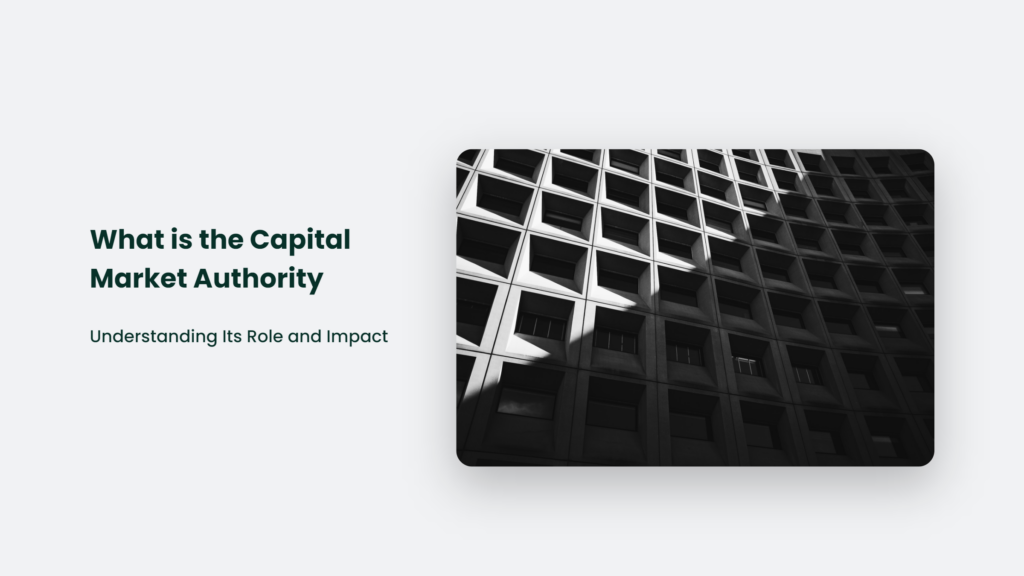When it comes to the world of finance and investments, the Capital Market Authority (CMA) plays a crucial role in maintaining order and ensuring the smooth functioning of the market.
But what is Capital Market Authority, and how does it impact the financial landscape? In this in-depth article, we’ll explore CMA’s ins and outs, providing a thorough understanding of its purpose, functions, and significance in finance.

What is Capital Market Authority?
The Capital Market Authority is a government financial regulatory entity responsible for supervising, licensing, and monitoring capital markets’ activities within a specific jurisdiction. It is an independent public agency that ensures the proper conduct of market intermediaries, such as stock exchanges, central depository, and settlement corporations. The CMA’s primary goal is to promote market integrity, investor confidence, and the orderly functioning of the capital markets.
The Functions of the Capital Market Authority
The CMA plays a vital role in regulating and developing the capital markets sector. Some of its key functions include:
- Licensing and supervising all capital market intermediaries.
- Ensuring proper conduct of all licensed persons and market institutions.
- Regulating the issuance of capital market products.
- Protecting investors from illegal practices, such as fraud, scam, cheating, or manipulation.
The Impact of the Capital Market Authority on the Financial Landscape
The Capital Market Authority (CMA) plays a pivotal role in the world of finance, ensuring the smooth functioning of capital markets and promoting investor confidence. In this section, we will delve into the impact of the CMA on the financial landscape, discussing its influence on investor confidence, market stability, and market growth.
Promoting Investor Confidence
One of the primary objectives of the CMA is to instil confidence in investors by ensuring that market intermediaries adhere to strict guidelines and regulations.
By maintaining a well-regulated environment, the CMA helps foster trust in the capital markets, encouraging investors to participate and contribute to the market’s growth. It, in turn, leads to a more robust and resilient financial landscape.
Maintaining Market Stability
The CMA’s regulatory oversight prevents market manipulation and other illegal practices. By closely monitoring the activities of market intermediaries and enforcing regulations, the CMA contributes to overall market stability. A stable market is essential for attracting new investors and issuers and maintaining the confidence of existing market participants.
Encouraging Market Growth
By providing a well-regulated and transparent environment, the CMA helps attract new investors and issuers, thereby promoting the growth of the capital markets.
A growing market is essential for the economy’s overall health, enabling businesses to access the capital they need to expand and innovate. A thriving market can also create new investment opportunities, further contributing to economic growth.
The Interconnected Nature of the Financial Landscape
The impact of the CMA on the financial landscape is not limited to its direct influence on investor confidence, market stability, and market growth. The CMA’s regulatory activities also indirectly affect other aspects of the financial landscape, such as the development of new financial products and services, the evolution of market infrastructure, and the overall competitiveness of the market.
For example, the CMA’s efforts to promote transparency and disclosure standards can lead to the development of new financial products that cater to investors seeking more information about their investments.
Similarly, the CMA’s focus on maintaining market stability can encourage the development of new market infrastructure, such as trading platforms and clearinghouses, that can further enhance the efficiency and resilience of the market.
The Power of Knowledge in the World of Finance
As the famous quote by Benjamin Franklin goes, “An investment in knowledge pays the best interest”. This statement holds in finance, where understanding the intricacies of the market and its regulatory bodies, such as the Capital Market Authority, can be the key to making informed investment decisions.
Frequently Asked Questions:
How does the Capital Market Authority protect investors?
The Capital Market Authority protects investors by ensuring that market intermediaries adhere to strict guidelines and regulations, preventing market manipulation and other illegal practices.
What are some examples of capital market intermediaries regulated by the CMA?
Some examples of capital market intermediaries regulated by the CMA include stock exchanges, central depository and settlement corporations, and other licensed persons under the Capital Markets Act.
How does the Capital Market Authority contribute to market growth?
By providing a well-regulated and transparent environment, the Capital Market Authority helps attract new investors and issuers, thereby promoting the growth of the capital markets.
In Conclusion
The Capital Market Authority plays a vital role in finance, ensuring the proper functioning of the capital markets and promoting investor confidence. By understanding the CMA’s functions and impact on the financial landscape, you can make more informed investment decisions and navigate the complex world of finance with greater ease. So, the next time you come across the term “Capital Market Authority,” you’ll know exactly what it entails and its significance in finance.




